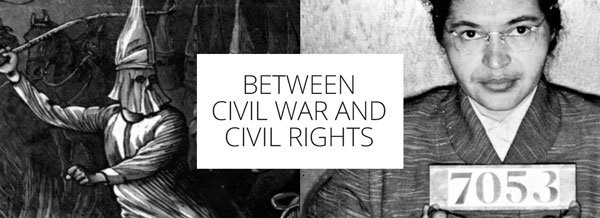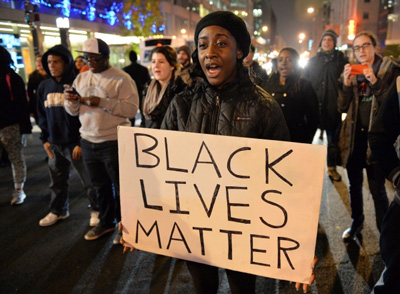 Epilogue: Terror and “Race” Today — A Projected Program
Epilogue: Terror and “Race” Today — A Projected Program

Between Civil War and Civil Rights (‘CW2CR’) explores and documents, among other things, how unexamined assumptions and beliefs—racialized mindsets disguised as “way of life”-type values—underlie many of the deep, sometimes paralyzing divisions we see today. The series examines, for example, how yesterday’s racialized “entertainment” sowed the seeds of today’s national divisions and political paralysis. How else can we explain the enormous gaps between “Whites,” “Blacks,” etcetera’s perceptions of prejudice: that many believe they experience racism every day, while others claim it no longer exists?
Racial violence has taken many guises over the years. Ku Klux Klan co-founder John C. Lester wrote that in 1866:
John C. Lester, Ku Klux Klan, Its Origin, Growth and Disbandment, 1905
And Klan-leader/antiquarian Richard Bondira says:
Richard Bondira, interview for Between Civil War and Civil Rights
According to its original leaders,
Plato Durham, Testimony Taken by the Joint Select Committee on the Condition of Affairs in the Late Insurrectionary States, North Carolina (“Ku Klux Klan hearings”) U.S. Congress, 1872
Over time, leaders built up these “obligations” into useful political themes:
Glenda Gilmore, “The Wilmington Race Riot and Black Women’s Political Organizing,” Oct 23, 1998
Until many Whites saw racial bias and violence as the “accidental” cost of “normal” “business as usual:”
Hugh McCrae II, Wilmington, North Carolina, interview for Between Civil War and Civil Rights
By the 19-teens, new leaders used the romantic defense of “traditional values” for a broad new appeal:
Richard Bondira, former Klan Grand Wizard
…which reached many because:
But by the middle of the century:
Adam Green, New York University, interview for Between Civil War and Civil Rights
Many would like to believe that we’ve put this history, or at least society-wide overt racial bias, behind us. But even if you don’t experience prejudice yourself, its effects linger:
Bertha Todd, Teacher and Activist, Wilmington, North Carolina
Where have we come to now, as a result of the artificial construction of “racial” difference?
Have you experienced racial privilege or racial deficit? What does ‘white privilege’ mean to you? Is it an experience, an illusion, a consciousness? How about “political correctness”?
 People have gotten in trouble for insisting that “all lives matter” rather than “Black lives matter.” If the “black race” is an artificial category, does that mean “Black Lives Matter” is a reverse-racist slogan? Or a temporary, tactical thing?
People have gotten in trouble for insisting that “all lives matter” rather than “Black lives matter.” If the “black race” is an artificial category, does that mean “Black Lives Matter” is a reverse-racist slogan? Or a temporary, tactical thing?
Finally, has the CW2CR series brought something new to you? And what would you like to see it become?
Send us your thoughts, contributions, ideas, to this page, this website, and this program-series. Help us find the sounds and images to explore, for instance:
- the racial bias of historical vagrancy laws and the modern “War on Drugs”;
- the long history of the “prison/industrial complex”, going back to peonage and the chain gang; and
- the many obstacles governments and the law have put in the way of Blacks accumulating and passing down wealth from generation to generation.
